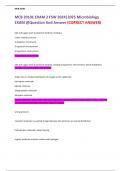Exam (elaborations)
MCB 2010C EXAM 2 FSW 2024|2025 Microbiology EXAM @Question And Answer (CORRECT ANSWER)
- Course
- MCB 2010C Microbiology
- Institution
- Florida Southwestern State College
MCB 2010C EXAM 2 FSW 2024|2025 Microbiology EXAM @Question And Answer (CORRECT ANSWER)
[Show more]



